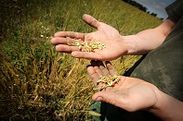FOR Communication: Politicians want to inhibit the development of Polish agriculture

As the prohibition on purchase of agricultural land by foreigners ends on 1 May 2016, politicians want to freeze the trade in agricultural land in general. Such will be the result of a law passed by the Parliament of the previous convocation and the draft law adopted by the Government of Beata Szydło on 23 February 2016. This will slow down the improvement of agricultural productivity and increase the outflow of workers to more productive sectors of the economy. Currently, Poland has the fourth lowest agricultural productivity and the fourth highest percentage of people working in agriculture in the European Union.
On 1 May 2016, there ends a transitional period negotiated with the EU, during which acquisition of agricultural land by foreigners was prohibited without special permission from the Ministry of Interior. That is why politicians want to freeze the trade in agricultural land in Poland completely. The amendment to the Act on shaping the agricultural system, proposed by PSL, was passed almost unanimously by the Parliament of the previous term (by the parties: PO, PiS, PSL, SLD) - only two non-attached MPs voted against - and signed by President Andrzej Duda in July 2016.
An analysis by the Bank PKO BP lists the following as the major changes introduced by the law:
1. The purchaser of land will have to cultivate the land personally and reside in the commune or its neighborhood.
2. Purchasers will not be able to hold land with a total area exceeding 300 ha.
3. Resale of land purchased from the Treasury will be banned for ten years.
4. Consent for the sale, exchange or donation of an agricultural property will be required from the local branch of the Agricultural Property Agency.
On February 23, the government adopted a draft law tightening further these limits:
1. Acquirers of agricultural real estate would have to be as a rule individual farmers, with agricultural qualifications, holding agricultural property with an area of up to 300 hectares, residing in the commune for at least five years;
2. The Treasury will suspend sale of agricultural property for a period of five years, and the agricultural land of the Agricultural Property Agency will only be leased to the farmers;
3. Purchasers will not be able to sell the acquired agricultural property for ten years and will have to operate the farm personally.
These changes will lead to the freeze on trade in agricultural land. Meanwhile, Polish agriculture is among the least productive in the European Union (Figure 1). The main reason for that is the small average size of farms in Poland, which according to Eurostat, in 2013 was 10 hectares to 16 hectares in the EU-28, 59 hectares in Germany, and 133 hectares in the Czech Republic. Small-scale of activities is confirmed by the fact that most Polish farms in the EU employ family members.
The share of agriculture in employment remains very high. According to Eurostat, in 2014 it amounted to 11.5% of the employed (fourth highest rate in the EU), compared to only 5% in the EU-28, 1.5% in Germany and 3.3% in the Czech Republic. At the same time in Poland productivity (measured by value added per worker) in agriculture is five times lower than in services (see FOR Report "Next 25 years"). This means that the outflow of workers from agriculture to other sectors would be associated with a significant improvement in the productivity of the entire Polish economy.
Up to now the process of quitting farming has continued successfully and spontaneously as a result of market forces. According to the World Bank, in 1990 25% of workers was employed in agriculture, the percentage twice larger than today. Thanks to improved productivity, agricultural production increased, despite the outflow of workers. Eurostat data indicate that in the years 2000-2013 the agriculture sector had the downright fastest growing productivity in Poland. In the years 2005-2013 the average size of a farm increased by 69%.
In 2013, farms with an area of over 100 hectares employed 3% of all workers in agriculture, while producing 16% of the value. Further consolidation of farms is unfortunately hampered by state subsidies. Annually, agriculture receives approx. 40 billion zł in subsidies to pensions from KRUS (the Agricultural Social Insurance Fund), EU subsidies and tax preferences (see FOR Report "Next 25 years"). This amount equals to almost the entire added value of agriculture, which according to Eurostat, was 45 billion zł, in 2014. Now politicians want to completely prevent the further consolidation because this will be the effect of the de facto freeze of trade in agricultural land.
Full communication by FOR (in Polish) available to download here.
1 http://www.sejm.gov.pl/sejm7.nsf/agent.xsp?symbol=glosowania&nrkadencji=7&nrposiedzenia=95&nrglo sowania=154.
2 PKO BP, Rynek nieruchomości gruntowych – działki rolne górą, Monitoring Branżowy, Analizy Sektorowe, 17.02.2016, http://www.pkobp.pl/centrum-analiz/analizy-sektorowe/raporty-branzowe/rynek-nieruchomosci-gruntowych-dzialki-rolne-gora/.
3 Komunikat CIR, 23.02.2016, http://www.minrol.gov.pl/pol/Ministerstwo/Biuro-Prasowe/Informacje-Prasowe/Komunikat-CIR
You are welcome to contact our expert:
Rafał Trzeciakowski, Economist an FOR
[email protected]
Files to download

